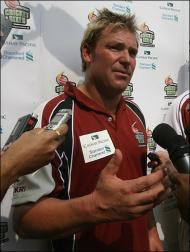
Test cricket's top wicket-taker Shane Warne said Sunday he will have no regrets when rival spin wizard Muttiah Muralitharan overtakes him at the top of the charts.Murali is currently on Sri Lanka's tour of Australia and is just nine short of breaking Warne's record 708 Test wickets."Good luck to Murali, the record doesn't really worry me," said Warne, who has retired from Test cricket but is in Hong Kong playing quickfire six-a-side cricket."It has been nice to hold the record for three or four years. I always played my style of cricket and the wickets were nice, but it is more about the spirit in which you play the game."I'd like to think I have been an entertainer in the 16 years or so I've been playing. I hope my legacy is that I've never given up, have always been competitive, and that people have enjoyed that. So the record is not the most important thing.""But," Warne added, "hopefully the Aussie batsmen can still make it a little bit hard for him."Murali, 35, and Warne, 38, both started their Test careers in 1992, but the Sri Lankan has only played in 113 matches, compared with the Australian's 145.In a coup for the Hong Kong Sixes, both the third and fourth all-time Test wicket-takers are also playing in the tournament -- Anil Kumble (566) and Glenn McGrath (563).Warne declined to respond to rumours he will play in either of the two rival money-spinning Twenty20 leagues being planned in India, but said more Sixes cricket would help promote the sport."It would be really good if we had a couple more weekends like this one," he said. "A Sixes event in a place like Dubai would be great to spread the word of cricket."The tournament, first held in 1992, produces frenetic cricket in which teams bat for only five overs each innings and every fielder has to bowl, apart from the wicketkeeper.It has a strong record of attracting the game's biggest names, with Viv Richards, Sachin Tendulkar and Andrew Flintoff all appearing in past years.And here is the rest of it.

